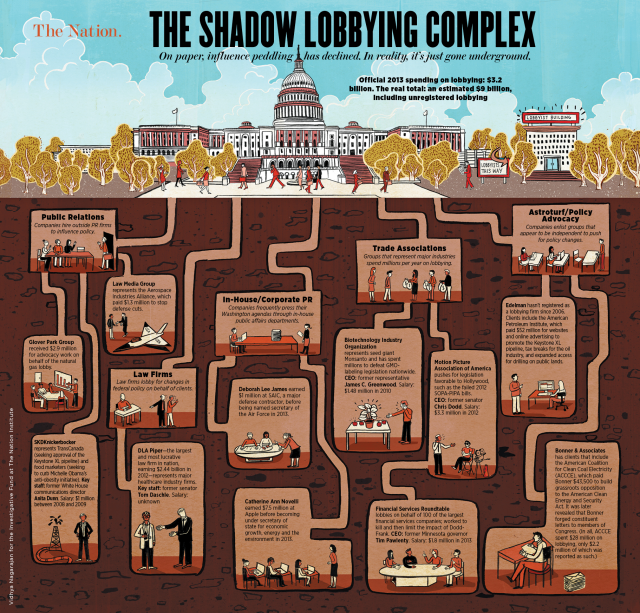Here is a typical example. Minority President Trump has said that he intends to get rid of 75% of government regulations. What is a “regulation”?
The term “regulation” is framed from the viewpoint of corporations and other businesses. From their viewpoint, “regulations” are limitations on their freedom to do whatever they want no matter who it harms. But from the public’s viewpoint, a regulation is a protection against harm done by unscrupulous corporations seeking to maximize profit at the cost of harm to the public. Continue reading
Tag Archives: Corporations
American corporations received 27 times more from the governement than they paid in taxes
Oxfam America took a close look at the way large, profitable companies use offshore tax havens and other methods to slash their corporate tax rates in the US rather than pay taxes where the majority of their business takes place.
The report, “Broken at the Top,” found that the 50 largest companies in the US have $1.4 trillion hidden in tax havens while at the same time receiving trillions of dollars in tax payer-funded loans and subsidies. The tax practices of these corporate behemoths cost Americans an estimated $111 billion per year and cost developing countries another $100 billion a year.
Apple, the world’s second-largest company, was the company with the greatest amount stored abroad — $181 billion in three subsidiaries. Next in Oxfam’s league table was General Electric, with $119 billion stored in 118 tax haven subsidiaries, followed by Microsoft which had $108 billion kept overseas. Continue reading
From a welfare state to a warfare state
But money in politics is not the only major institutional factor in which everyday and state violence are nourished by a growing militarism. As David Theo Goldberg has argued in his essay “Mission Accomplished: Militarizing Social Logic,” the military has also assumed a central role in shaping all aspects of society. Militarization is about more than the use of repressive power; it also represents a powerful social logic that is constitutive of values, modes of rationality and ways of thinking. According to Goldberg,
The military is not just a fighting machine…. It serves and socializes. It hands down to the society, as big brother might, its more or less perfected goods, from gunpowder to guns, computing to information management … In short, while militarily produced instruments might be retooled to other, broader social purpose – the military shapes pretty much the entire range of social production from commodities to culture, social goods to social theory.
The Shadow Lobbying Complex
Lee Fang, “Where Have All the Lobbyists Gone?,” 19 February 2014, The Nation

The Sorry State of Corporate Taxes
“The Sorry State of Corporate Taxes,” February 2014, Citizens for Tax Justice
Profitable corporations are supposed to pay a 35 percent federal income tax rate on their U.S. profits. But many corporations pay far less, or nothing at all, because of the many tax loopholes and special breaks they enjoy. This report documents just how successful many Fortune 500 corporations have been at using these loopholes and special breaks over the past five years. …
Continue reading
What We Can Learn from America’s First Tea Party About Countering Corporate Power
Thom Hartmann, “What We Can Learn From America’s First Tea Party About Countering Corporate Power“, Yes! Magazine, July 04 2013
Before there was Citizens United, a modern Tea Party movement, or national momentum to ban corporate personhood, Thom Hartmann shows that resistance to corporate power is just as patriotic as Boston’s original Tea Party.
On a cold November day, activists gathered in a coastal town. The corporation had gone too far, and the two thousand people who’d jammed into the meeting hall were torn as to what to do about it. Unemployment was exploding and the economic crisis was deepening; corporate crime, governmental corruption spawned by corporate cash, and an ethos of greed were blamed. “Why do we wait?” demanded one at the meeting, a fisherman named George Hewes. “The more we delay, the more strength is acquired” by the company and its puppets in the government. “Now is the time to prove our courage,” he said. Soon, the moment came when the crowd decided for direct action and rushed into the streets.
That is how I tell the story of the Boston Tea Party, now that I have read a first-person account of it. Continue reading